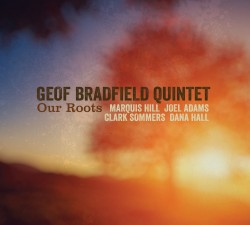MUSIC REVIEW BY Dave Sumner, Bird is the Worm
There's something pretty cool about the way saxophonist Geof Bradfield uses old school blues and sacred music of the South as a way to pivot to varying expressions of hard bop, spiritual jazz, modern post-bop and even a quasi-contemporary jaunt on one track, while keeping the different expressions corralled under the basic concept and theme. With Clifford Jordan's Leadbelly tribute (1965's These Are My Roots: Clifford Jordan Plays Leadbelly) as his central thesis, on Our Roots, Bradfield and quintet cycle through a set of tunes by Leadbelly, the Georgia Sea Island Singers, Blind Willie Johnson and three original pieces, each in their own way as set down in the past yet bound together by the vision of today.
The traditional "Adam in the Garden," Leadbelly's "Yellow Gal" and the Bradfield original "Clinton Hill" each anchor themselves to the blues, one with lines of age and seams of wisdom, but that anchor does nothing to prevent the bursts of volatility and leaps of melodicism and harmony that take the songs far and wide from that central focal point.
No less noteworthy in terms of the embrace of music from different eras is the traditional song "Before This Time Another Year." Bradfield and crew take that spiritual and play with an underlying intensity reminiscent of John Coltrane's own spiritual jazz tune "India." But then, with this quintet propelled by a three-horn front line, the harmonic force of delivery is even further reminiscent of French horn specialist John Clark's own rendition of Coltrane's "India" (on his under-the-radar 1997 recording I Will). And with the coup-de-gras of Bradfield's quintet giving it their own modern touch, it becomes a four-stage bit of time travel down the lineage of blues, jazz and sacred music.
The original Bradfield composition "Mbira Song" would've fit in just fine during Coltrane's first run at the Vanguard, and that it's sandwiched unobtrusively between a languid take on Leadbelly's "Dick's Holler" and an emphatic rendition of Blind Willie Johnson's "Dark Was the Night, Cole Was the Ground" goes a long way as evidence of the strength of Bradfield's quintet's vision. Speaking of Blind Willie Johnson, the quintet's gorgeous take on "Motherless Children" is arguably the album's finest.
But this is an album of many such moments. Between Our Roots and Bradfield's previous recording Melba!, you're not likely to find a better one-two combo of successive releases than that.
The traditional "Adam in the Garden," Leadbelly's "Yellow Gal" and the Bradfield original "Clinton Hill" each anchor themselves to the blues, one with lines of age and seams of wisdom, but that anchor does nothing to prevent the bursts of volatility and leaps of melodicism and harmony that take the songs far and wide from that central focal point.
No less noteworthy in terms of the embrace of music from different eras is the traditional song "Before This Time Another Year." Bradfield and crew take that spiritual and play with an underlying intensity reminiscent of John Coltrane's own spiritual jazz tune "India." But then, with this quintet propelled by a three-horn front line, the harmonic force of delivery is even further reminiscent of French horn specialist John Clark's own rendition of Coltrane's "India" (on his under-the-radar 1997 recording I Will). And with the coup-de-gras of Bradfield's quintet giving it their own modern touch, it becomes a four-stage bit of time travel down the lineage of blues, jazz and sacred music.
The original Bradfield composition "Mbira Song" would've fit in just fine during Coltrane's first run at the Vanguard, and that it's sandwiched unobtrusively between a languid take on Leadbelly's "Dick's Holler" and an emphatic rendition of Blind Willie Johnson's "Dark Was the Night, Cole Was the Ground" goes a long way as evidence of the strength of Bradfield's quintet's vision. Speaking of Blind Willie Johnson, the quintet's gorgeous take on "Motherless Children" is arguably the album's finest.
But this is an album of many such moments. Between Our Roots and Bradfield's previous recording Melba!, you're not likely to find a better one-two combo of successive releases than that.
Soundclips
Other Reviews of
"Our Roots":
JAZZIZ by Bob Weinberg
Downbeat by Michael Jackson
Jazz History Online by Thomas Cunniffe
Chicago Tribune by Howard Reich
WTJU - Richmond by Dave Rogers
South Bend Tribune by Howard Dukes
Chicago Reader by Peter Margasak
Downbeat by Peter Margasak
Downbeat by Brian Zimmerman
KUCI, Irvine, CA by Hobart Taylor
Midwest Record by Chris Spector
All About Jazz by Mark Corroto
All About Jazz by Dan McClenaghan
